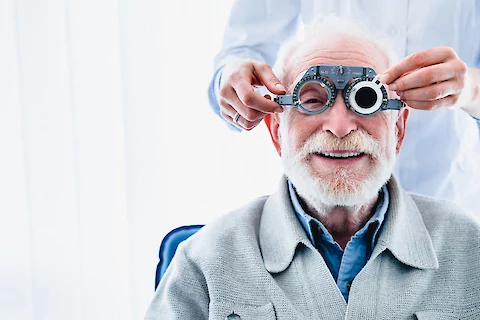
How Often Should Seniors in Their 70s and 80s Have an Eye Exam?
Regular eye exams for seniors are essential to keeping them healthy as they age. Eye exams help detect vision problems and spot signs of other health conditions before symptoms appear.
For people in their 70s and 80s, there are a few things to consider regarding how often they should get their eyes checked by an optometrist or ophthalmologist.
How Often to Get an Eye Exam in Your 70s and 80s
Generally, seniors in their 70s and 80s should get an eye exam at least once a year. However, certain factors can increase the frequency of visits to an eye doctor. These include any previous vision problems or family history of ocular disease, as well as diabetes or high blood pressure, which can affect vision.
Risk Factors: When Should Seniors Get More Frequent Eye Exams
If a senior has any of the above risk factors, a doctor may recommend more frequent eye exams. Seniors with diabetes should get an eye exam at least once a year, and those with high blood pressure may need to see their optometrist twice a year.
What Type of Eye Exam Does a Senior Need?
The type of eye exams for seniors will depend on their age, medical history, and any current vision problems. Generally speaking, seniors in their 70s and 80s should get a comprehensive eye exam that includes tests for glaucoma and cataracts. Depending on their situation, the doctor may also suggest an Amsler grid test to check for macular degeneration or a retinal imaging test to look for signs of disease.
The Most Common Eye Problems for Seniors
As we age, our eyes can be affected by various conditions. Common eye problems for seniors include:
- Cataracts
- Glaucoma
- Age-related macular degeneration (AMD)
- Diabetic retinopathy
These conditions can lead to vision loss or even blindness if left untreated. Seniors should have regular checkups with their optometrist or ophthalmologist to catch any conditions as soon as possible.
The Benefits of Regular Eye Exams for Seniors
Regular eye exams for seniors are essential for maintaining good vision and overall health. There are several benefits to having an eye exam at least once a year, including:
Improved Quality of Life
Regular eye exams ensure that a senior's vision is at its best. This can help them enjoy reading, driving, and sports without worrying about poor vision. Regular checkups also allow doctors to monitor any changes in their eyesight over time so they can detect any problems early on.
Early Detection of Any Problems
By getting regular eye exams, doctors can detect any problems with a senior's eyes early on and provide treatment. Early detection of any vision issues or diseases can help prevent further damage to the eyes and reduce the risk of permanent vision loss.
Reducing the Risk of Age-Related Vision Problems
Regular eye exams can also help reduce the risk of age-related eye problems such as cataracts, glaucoma, and AMD. By detecting these conditions early on, seniors can get treatment before their vision is significantly impacted. This helps keep their eyes healthy and their vision sharp for years.
Senior Helpers Can Help Elderly Loved Ones Maintain Good Eye Health
If you're a senior in your 70s or 80s, you need regular eye exams to maintain good vision and overall health. There are several benefits to having an eye exam at least once a year, including improved quality of life and early detection of any problems. If you have any risk factors for vision problems, your doctor may recommend more frequent eye exams.
If you need help scheduling or getting to your vision appointments, talk to the Senior Helpers Dayton team. We offer in-home care services for seniors in the Centerville, Beavercreek, Oakwood, and Kettering areas. Call us at 937-230-4213 or contact us through our website to schedule an in-home consultation to learn more about our services.